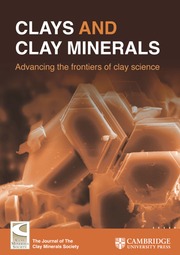Article contents
Evolution of Benzylammonium-Vermiculite and Ornithine-Vermiculite Intercalates
Published online by Cambridge University Press: 28 February 2024
Abstract
This report consists of a study of l-ornithine hydrochloride-vermiculite and of benzylammonium hydrochloride-vermiculite complex. The evolution of these organo-vermiculite structures upon heating is studied by X-ray diffraction (XRD) as well as infrared spectroscopy.
After heating vermiculite saturated with 1-ornithine cations, it shows condensation of interlayer ornithine molecules (peptide complexes). The stacking mode, opposing ditrigonal cavities, is not modified between aminoacid complex and peptide complex.
For vermiculite saturated with benzylammonium cations, the stacking sequence changes through heating by changing benzylammonium to NH4+. This transformation implies a sliding of the layers over each other. The ditrigonal surface cavities become face to face, as in the original mica. There are no random translations as in the starting complex.
- Type
- Research Article
- Information
- Copyright
- Copyright © 1996, The Clay Minerals Society
References
- 7
- Cited by


